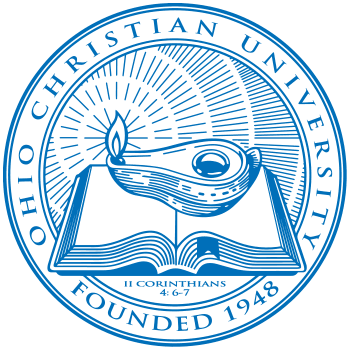Nature of Educational Programs
- In general, all programs are reviewed by multiple committees and the Board of Trustees. The language provided in the Catalog is also reviewed by both the Dean of the appropriate School and the Provost before it is published in an attempt to provide accurate information to students and the public.
- Accreditation information is published on the Ohio Christian website and publicity materials according to the standards set in place by the accreditation body. Most materials simply state that OCU is accredited and provide a link to the accreditation body. (https://www.ohiochristian.edu/about/accreditation-and-recognition/).
- Ohio Christian materials are focused on informing students concerning how they may transfer credits from other colleges into OCU. We are not aware of statements concerning the acceptance of OCU credits to other institutions in any of our documents or web pages. OCU staff and faculty are cognizant of the fact that the transferability of any credits from OCU is wholly dependent upon the receiving institution.
- Ohio Christian materials and staff do not promise that the successful completion of a course of study will result in a position with any organization or a state or industry certification. OCU does, however, offer courses that are designed to prepare students for fields in which a state or industry certification is required. This is especially true for the fields of education and substance abuse counseling. For substance abuse counseling, the program is designed to help students meet the 180 hours of chemical dependency education required as a prerequisite for licensure, but licensure is not guaranteed by taking the coursework. It is made clear in the Catalog that students must earn 40 clock hours to be eligible to apply to the Ohio Chemical Dependency Professionals Board and then the student must work in the field before taking the state test for licensure.
- The requirements for successfully completing the course of study are clearly outlined in the Catalog. Graduation requirements, obtaining additional degrees or certificates, general education requirements, and the specific requirements for qualifying for a specific major provide detailed information for the student. In addition, professional academic advisors utilize a pro-active model of advising to reach out to students at key points to discuss their progress. Behavioral and academic standards are clearly outlined in the Catalog and include information on the disciplinary process and sanctions for violations of either the behavioral standards or academic standards.
- The location, facilities, and equipment available for students in Ohio Christian programs is provided on the OCU Website. OCU uses up-to-date computer equipment and other technology in classrooms. OCU faculty meet or exceed the Higher Learning Commission’s requirements for training and education and the Ohio Department of Higher Education’s expectation related to the number of faculty per student.
- Academic advising is clearly explained to students. In the online program, students receive a welcome e-mail a week before they begin class. Students are required to discuss their next semester’s schedule before they can be registered. Students can also take advantage of career services, which helps students with resume building and preparing for interviews.
- Prerequisites are clearly marked in the Catalog.
- The Catalog defines the content of the course of study, degree requirements, and other facts.
- Ohio Christian does not offer any degree or program that is not authorized by the State of Ohio and the Higher Learning Commission or by a specialized accreditation organization.
- All matters under 668.42 and 668.43 are disclosed to students in various sources including the Catalog, financial aid materials, and admissions materials.
